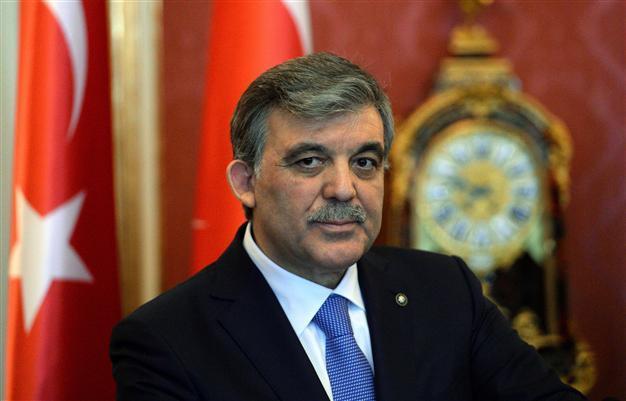Turkish President Gül orders probe into wiretapping, corruption fight
ANKARA

Turkish President Abdullah Gül his under pressure to speak out over the scandals rocking the government. AFP Photo
President Abdullah Gül has taken a remarkable initiative for the auditing of several topics that have been dominating Turkey’s national agenda over the last few months, including wiretapping, discrimination of career professionals such as judges and prosecutors, urban rent, and the fight against corruption.Gül, who has repeatedly underlined the importance of concepts such as good governance, transparency and accountability since his time as foreign minister, authorized the State Audit Board (DDK), a top state body working under the presidency, to launch investigations into the five topics, a written statement posted on the official website of the presidency announced.
Accordingly, the DDK will launch examinations, investigations and inspections on all of those topics.
“The president has given instructions ... to assess the institutional and regulatory capacity regarding wiretapping in our nation and to determine what measures need to be taken to comply with the law ... [and to] research the capacity to fight corruption,” the statement said.
Gül’s authorizing of the DDK comes after the revelation of a huge graft probe on Dec. 17. The probe has involved many high-profile names and relatives of ruling Justice and Development Party (AKP) members.
Legal framework
The statement from the presidency underlined how wiretapping should be conducted “within a framework that would provide effective and legal operation of the public administration,” while also touching upon auditing “the application of and standards regarding the use of encrypted communication devices.”
Late last month, Istanbul Chief Prosecutor Hadi Salihoğlu announced that at least 2,280 people had been wiretapped in Turkey, both indirectly and directly, since 2011.
During the same days, audio recordings of an alleged conversation between Prime Minister Recep Tayyip Erdoğan and his son Bilal, in which the prime minister ordered his son to dispose of vast amounts of cash Dec. 17, were released.
Similar audio recordings showing the alleged interference of Erdoğan and his family in public tenders and the judiciary, as well as in the elections at the Turkish Football Federation (TFF), have also been leaked in a steady stream. All have been denied by the prime minister, who describes them as “montages” or “fabricated technically” by a movement backed by the U.S.-based Islamic scholar Fethullah Gülen. Senior Cabinet members have recently suggested that the Gülen movement threatened and blackmailed Erdoğan and his government before the release of these recordings.
The corruption and bribery probe has implicated the sons of three Turkish ministers, businessmen and the chief of the state bank.
Barış Güler, the son of former Interior Minister Muammer Güler; Barış Kaan Çağlayan, son of former Economy Minister Zafer Çağlayan and Reza Sarrab, an Azeri origin businessmen who allegedly bribed four ministers, were released pending trial on Feb. 27. With their release, there are no suspects left behind bars in the corruption probe.
Gül, a comrade of Erdoğan since at least when the AKP was founded in 2002 and a former prime minister and foreign minister, has come under pressure to speak out over the scandals. The pressure has come from various fronts, including from within the Gülen movement.
According to the latest statement from the presidency, Gül’s order also requires auditors to look at the process by which judges and prosecutors are chosen, and to assess rules surrounding “state secrets.”
Last month, Parliament approved a new law tightening executive control of the judiciary, a move Erdoğan’s critics say is a further attempt to snuff out the corruption allegations after the government dismissed or reassigned thousands of police officers and hundreds of judges and prosecutors.
A considerable portion of the corruption and bribery charges are assumed to have been related to construction tenders. The presidential statement emphasized that Gül’s order regarding urban rent aimed at a comprehensive examination of fairly sharing rent emerging from zoning and urbanization practices and matters, such as methods and tools of societal participation and the auditing of urban planning and zoning changes.
















